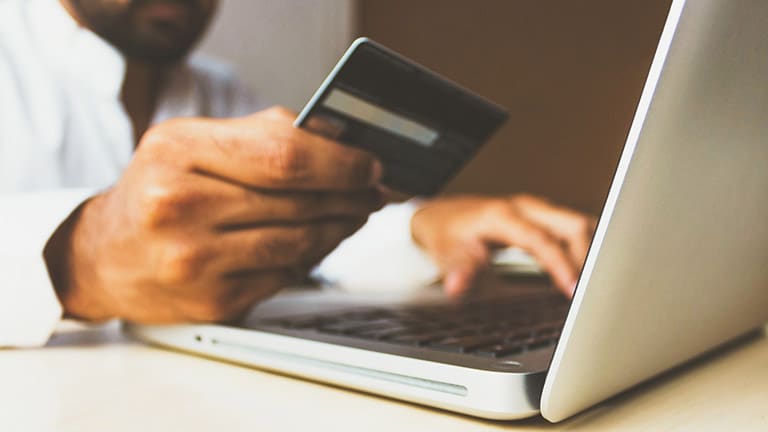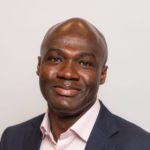Through finance for all, we can unleash society’s potential
Featured Members

David Dwumah is the Founder and CEO of financial technology company OurBanc Corporation, which focuses on improving the financial health of Americans and reducing the racial wealth gap.
Tell us about OurBanc’s mission and how it is pursuing its work in alignment with the guiding principles of inclusive capitalism.
Our mission is to do our part in dismantling the systematic barriers that exist within America’s financial system by providing historically disenfranchised people with more transparent and equitable financial products and services. To do this, we believe in and are leaning into public policy and innovations in faster payments and open finance to drive financial inclusion.
We set very bold and audacious goals for ourselves. First, we have committed to facilitating access to patient and mission-aligned capital for minority-owned companies and underfunded startups. Second, we have enabled everyday people to learn about early-stage investing and invest alongside institutional and accredited investors. We accomplished this by leveraging Regulation Crowdfunding which lowered the barriers to investing and ensured more open and inclusive access to our Seed round.
We place a strong emphasis on earning the trust of all our stakeholders and continue to build a foundational business that is sustainable and long-term focused. We value transparency because this goes a long way in building and maintaining trust among all our stakeholders. We are building a diverse and inclusive ecosystem based on the principles of fairness and equity through our comprehensive approach to incorporating real-time financial education and access to equitable financial solutions. We are bringing together public and private institutions and community stakeholders to help design sustainable solutions for existing socioeconomic problems, discover new opportunities that create prosperity for all, and build a trusted ecosystem.
Describe the un-banked and underbanked population in the United States. Who are they and what do they struggle with?
We describe unbanked households as those in which no one has a checking or savings account at a bank or credit union. The United States Federal Deposit Insurance Corporation (FDIC) reports that the average percentage of unbanked households is significantly higher for some populations: 13.8% of Black households, and 12.2% of Hispanic households are unbanked, compared to 2.5% of white households. And rates are disproportionately higher among low-income households. To address this, the FDIC launched its #GetBanked initiative, whose tenets are a source of inspiration for OurBanc’s Mobile app.
According to 2019 Federal Reserve estimates, the unbanked and underbanked population in the U.S. is 22% of adults — 63 million people.
These 63 million unbanked or underbanked are estimated to spend an average of $3,000 in annual costs per person on alternative financial services such as payday loans, out-of-network ATM fees, and check cashing fees.
You were one of the coauthors of the U.S. Faster Payments Council’s Faster Payments and Financial Inclusion white paper that identifies eight areas of pain points to the use of faster payments for families and small businesses who face shortages of time and cash. Which ones do you think are the most pressing?
Many Americans struggle with their finances, and the financial health among disenfranchised communities continues to deteriorate. While all the pain points highlighted in the paper are critical, product design, liquidity constraints, and a lack of trust in financial services providers, I think, are the most pressing issues that we need to address.
The nuances of the challenges within underserved communities are not fully understood and appreciated; hence the proper remedies are not incorporated into designed solutions. These challenges will negatively impact all stakeholders in the long run if left unresolved.
A poorly designed business model with features the user does not use, exorbitant fees, and high-interest rates are not sustainable. We must utilize the latest innovations in more equitable and accessible faster payments to lower costs and facilitate liquidity.
OurBanc is focused on mobile banking and financial technology tools to close the gap between those with access to financial tools and the underbanked. In November, you will release the first phase of OurBanc’s flagship mobile banking app. How does this app address the pain points you just mentioned?
We are building an inclusive and equitable platform that improves the financial health of our customers in two ways. First, our Personal Financial Management application provides our customers with personalized, actionable insights and an easy way to manage spending, savings, and borrowing. We have designed our product to address some immediate challenges in underserved communities. For example, to help lower cash withdrawal fees for our members, we are introducing features that prominently shows nearby in-network fee-free ATMs and cashback stores that allow cash back at the point of purchase for no additional charge. We will also continue to engage our community members to refine and improve the services that address their future needs.
To address liquidity constraints and lack of trust, we will partner with financial institutions and local community-based organizations to provide our members with cost-effective consumer loans, investment solutions, insurance products, and actionable financial education.
In addition to personal finance, OurBanc is also facilitating access to capital for minority-owned companies and institutions. What unique barriers do minority-owned companies face when looking for funding?
Low or negative net worth among minorities is one of the enduring legacies of persistent economic exclusion and intergenerational wealth inequality. Many minority-owned companies, women founders, and founders from various underrepresented groups face daunting challenges when looking for funding. Raising initial funds from personal savings, friends, and families is especially difficult due to the limited disposable funds available among those groups for reinvestment.
Minority founders often experience a lack of willingness from members of their communities to invest. This hesitation to invest is understandable, given the risk that they may not get the desired return on investment or may even lose everything. Due to financial exclusion, many underserved communities must rely on predatory financial services or invest in questionable investment schemes resulting in losses. Minority founders also face deep skepticism from mainstream investors despite compelling business opportunities.
Minority founders generally receive less ecosystem support – all those things beyond money that are necessary to build a sustainable business, such as operational support, distribution channels, advocacy and mentorship, and general infrastructure – which further exacerbates existing challenges. While funding is critical, we must develop policies and provide resources to build healthy and vibrant ecosystems for minority-owned businesses. I believe that this area offers tremendous opportunities for innovation and growth.
We believe our efforts will help create opportunities for yet-to-be-discovered geniuses who will do great things beyond our imagination.
Describe how OurBanc is helping entrepreneurs overcome these barriers.
Our initial commitment is to facilitate access to patient and mission-aligned capital for minority-owned companies and underfunded startups. To do this, we plan to do the following:
- Commit and allocate 15% of our Series A and B to underrepresented founders that are building, or scaling companies aligned with the United Nations’ 17 Sustainable Development Goals (SDGs) by December 2026
- Facilitate and support $100M in deposits to Minority Depository Institutions (MDIs) and Community Development Financial Institutions CFDIs by December 2025
- Facilitate and support $1B in deposits to Minority Depository Institutions (MDIs) and Community Development Financial Institutions CFDIs by December 2030
- Provide low barrier, open, and inclusive access to our Seed round (100% allocation) and Series A (30% allocation) leveraging Regulation Crowdfunding, thereby enabling everyday people to participate in and learn about early-stage, alongside institutional and accredited investors through December 2022
Why does financial inclusion matter to the health of our economies? Our communities?
Economic inequality and a lack of access to opportunities have historically created societal tensions. Today, we are experiencing high income and wealth inequality, various domestic socio-political and economic challenges, individual mental health and wellness declines, and climate issues. We must view these as an inflection point and an opportunity for thoughtful and inclusive collaborative solutions that benefit us all.
Equitable financial inclusion provides the opportunity to allocate the appropriate resources better to unleash the creativity and productivity that has always existed amongst our historically disenfranchised communities. By implementing a more inclusive financial system, we give ourselves a much better chance to resolve these domestic and global challenges, bolster trust and confidence in our economic system and way of life and demonstrate our ability to adapt to changing times.
Equitable financial inclusion offers us an excellent opportunity to bring together experts and passionate people to make impactful changes to our economy, catalyze future GDP growth and ensure that we continue to lead in creating innovative solutions to our challenges.
What would you ask companies not directly related to the banking and financial services sector to do to support financial literacy and health?
I would ask companies outside the banking and financial sector to seek opportunities to collaborate on creating financial literacy and health awareness in ways that matter to their stakeholders. Collaboration could be with companies in the financial industry, institutions of learning, online and digital platforms, and community organizations, among others.
Institutions can collaborate to help the public learn about sound investment concepts such as long-term investing, diversification, and personalized risk management. Retail or smaller investors could invest alongside institutional investors without having to take outsized risks relative to their net worth. For example, regulation Crowdfunding “Reg CF” allows private companies to raise a maximum of $5M from all Americans. Any American can invest as little as $50 in a private company that they believe in or that aligns with their principles. Through increased awareness and education around Reg CF, everyday Americans can choose to become owners and not just customers of these companies.
Let’s consider a company that produces products that cater to environmentally conscious consumers. This single company could collaborate with any of the abovementioned organizations to provide a financial literacy and health program designed around a healthy economic lifestyle that encompasses sustainability and environmental health principles. Consumers and producers within this ecosystem would be able to finance, invest in, create, produce, and design products and services that align with their environmentally conscious ecosystem. Imagine this model multiplied across many different ecosystems, companies, time, and space, and you begin to visualize the potential impact of massive positive change in society. A well-designed financial literacy and health program paired with financial inclusion could incentivize consumers to become owners and contributors over time.
What are some of the promising signals you see for the future? What gives you hope?
The level of awareness and consciousness among our youth about critical domestic and global issues has profoundly impressed me. I am very encouraged by conversations with people from various socio-economic backgrounds, racial and age groups, and genders about the importance of financial inclusion. I believe this environment offers policymakers and thought leaders an excellent opportunity to connect with the public to co-create solutions in previously impossible ways. I am hopeful about our future because the youth and forward-thinking people are already challenging the status quo and creating more equitable and innovative solutions for all. Thank you.

